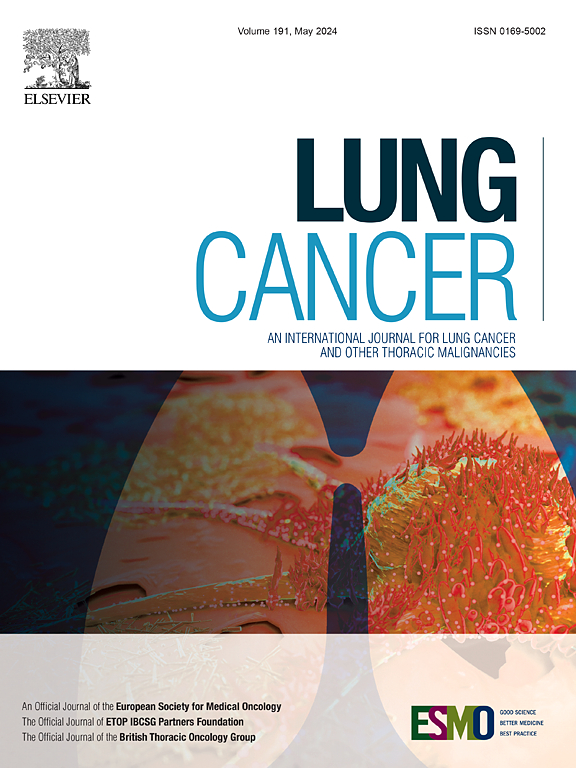Therapeutic modalities for superior sulcus tumor (Pancoast) tumor – A systematic review
IF 4.4
2区 医学
Q1 ONCOLOGY
引用次数: 0
Abstract
Background
Superior sulcus tumors (SST) are usually treated with multimodal therapy, mainly trimodal therapy encompassing radiochemotherapy (CRT) followed by surgery. However, high-level evidence from randomized trials remains limited. We conducted a systematic review to assess the evidence of treatment strategies considering adverse events and oncologic outcomes.
Methods
We systematically searched MEDLINE, CINAHL, EMBASE, Web of Science, CENTRAL, grey literature databases, and clinical trial registries. We included prospective and retrospective studies published between 1990 and 2024 with mono-, bi- or trimodal treatment reporting outcomes such as overall survival (OS), progression-free survival (PFS), resection rates, postoperative mortality/morbidity, and adverse events. Studies required histologically confirmed SST and a minimum of 30 patients.
Results
Thirty-five studies were included (28 retrospective, 7 prospective), with follow-up ranging from 10 to 107 months. Most studies originated from Europe (n = 16) and North America (n = 14). Sample sizes ranged from 30 to 2910 patients, predominantly male and aged in the late 50s to early 60s. Induction CRT protocols varied widely. R0 resection rates were reported in 33 studies, and trimodal therapy outcomes in 12. Hematotoxicity and esophagitis were the most common adverse events. Five-year OS rates varied between 11.8 % and 77 %, with trimodal therapy associated with better survival and distant metastasis as the dominant recurrence pattern. There were no studies addressing immunotherapy.
Conclusion
While trimodal therapy remains the guideline-endorsed standard for SST, comparative evidence remains sparse. The role of immunotherapy in induction regimens warrants further investigation.
上沟肿瘤(Pancoast)的治疗方法综述
背景上沟肿瘤(SST)通常采用多模式治疗,主要是三模式治疗,包括放化疗(CRT)和手术。然而,来自随机试验的高水平证据仍然有限。我们进行了一项系统综述,以评估考虑不良事件和肿瘤预后的治疗策略的证据。方法系统检索MEDLINE、CINAHL、EMBASE、Web of Science、CENTRAL、灰色文献数据库和临床试验注册库。我们纳入了1990年至2024年间发表的前瞻性和回顾性研究,这些研究报告了单、双或三模式治疗的结果,如总生存期(OS)、无进展生存期(PFS)、切除率、术后死亡率/发病率和不良事件。研究需要组织学证实的SST和至少30例患者。结果纳入35项研究(28项回顾性研究,7项前瞻性研究),随访时间为10 ~ 107个月。大多数研究来自欧洲(n = 16)和北美(n = 14)。样本量从30人到2910人不等,主要是男性,年龄在50多岁到60多岁之间。感应CRT协议差异很大。33项研究报告了R0切除率,12项研究报告了三模式治疗的结果。血液毒性和食管炎是最常见的不良事件。5年的总生存率在11.8%到77%之间,三模式治疗与更好的生存率和远处转移相关,是主要的复发模式。没有针对免疫疗法的研究。结论:虽然三模式治疗仍然是SST的指南认可标准,但比较证据仍然很少。免疫治疗在诱导方案中的作用有待进一步研究。
本文章由计算机程序翻译,如有差异,请以英文原文为准。
求助全文
约1分钟内获得全文
求助全文
来源期刊

Lung Cancer
医学-呼吸系统
CiteScore
9.40
自引率
3.80%
发文量
407
审稿时长
25 days
期刊介绍:
Lung Cancer is an international publication covering the clinical, translational and basic science of malignancies of the lung and chest region.Original research articles, early reports, review articles, editorials and correspondence covering the prevention, epidemiology and etiology, basic biology, pathology, clinical assessment, surgery, chemotherapy, radiotherapy, combined treatment modalities, other treatment modalities and outcomes of lung cancer are welcome.
 求助内容:
求助内容: 应助结果提醒方式:
应助结果提醒方式:


